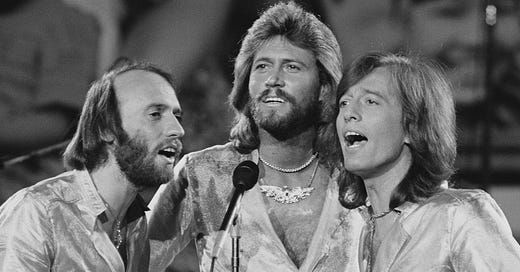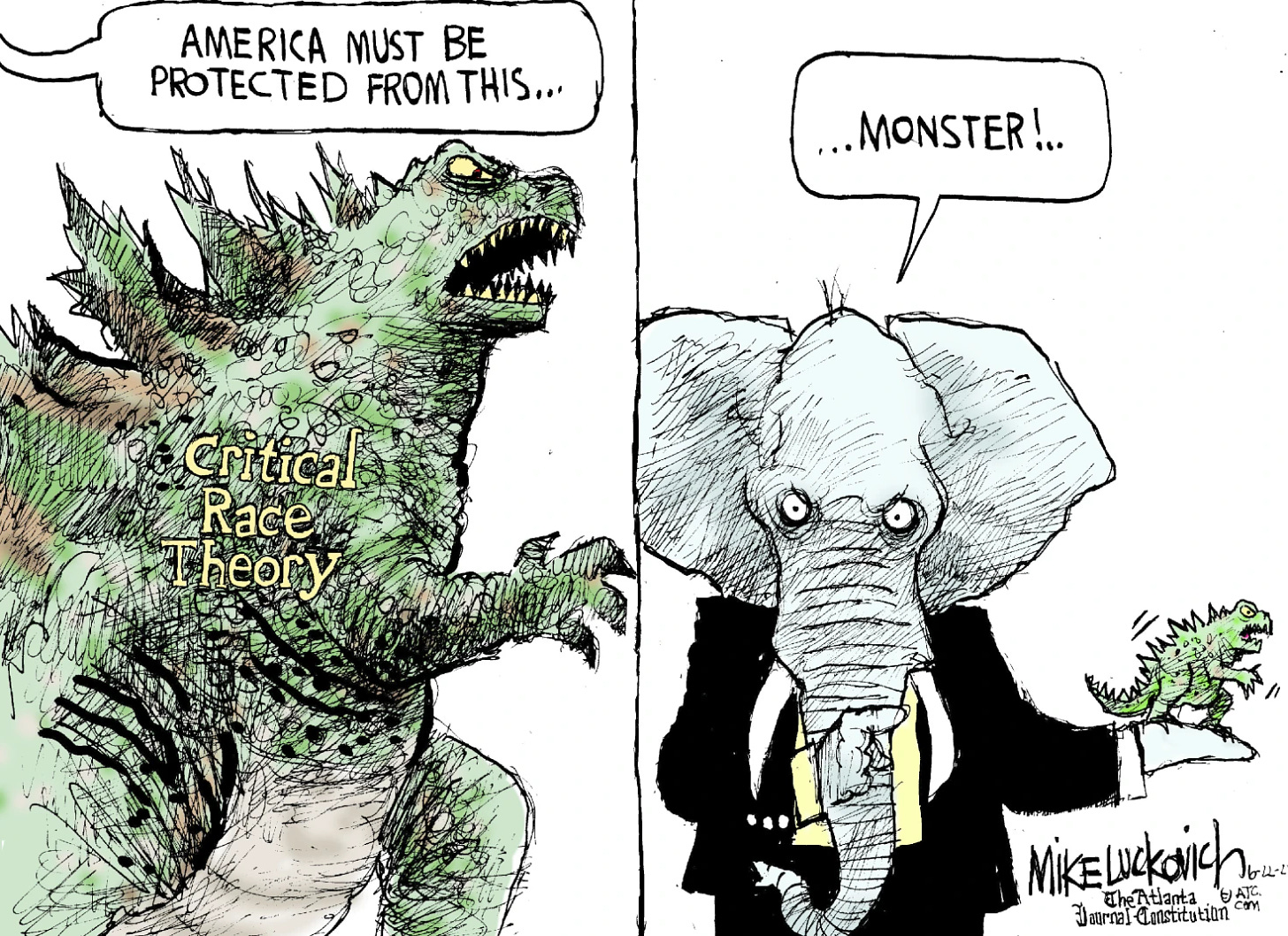Stayin' Power: My Day With the Bee Gees
Hanging out with Barry Gibb high above the East Coast in the wake of "Saturday Night Fever." Plus: Bee Gee covers by Bruce Springsteen, Al Green and Janis Joplin.
The Bee Gees? Yes, they remain “Stayin Alive” today thanks to a popular documentary last year and now a new tribute by the Foo Fighters, who offer half a dozen covers on a new album. (They did “You Should Be Dancing” on Sunday at the first concert by anyone at Madison Square Garden since pre-Covid, which I presented yesterday.) Anyway, here is my account, another excerpt from my memoir-in-progress, of the day I spent with them—largely in the air—at the height of their Saturday Night Fever popularity back in 1978, for a Crawdaddy cover story.
News & Politics
Andy Borowitz claims: “Mitch McConnell Warns That Voting Bill Would Bring U.S. to Brink of Democracy.”
The Onion: “Experts Encourage Americans To Start Thinking About What Form Of Government They’d Like To Try After Democracy Crumbles.”
Daily Beast: Trump Wanted His Justice Department to Stop ‘SNL’ From Teasing Him. “According to two people familiar with the matter, Trump had asked advisers and lawyers in early 2019 about what the Federal Communications Commission, the courts systems, and—most confusingly to some Trump lieutenants—the Department of Justice could do to probe or mitigate SNL, Jimmy Kimmel, and other late-night comedy mischief-makers.”
Jimmy Kimmel responded: “This is what Trump wanted — a goon squad, a bunch of tough guys to rough people up — because he can’t take a joke. He can only make one. In fact, he’s made several: Eric, Ivanka, Don Jr.” Colbert complained that he had merely been lumped with other late night “mischief-makers.”
He’s dead to me: A book out next week on Trump's handling of COVID, Nightmare Scenario, reports that he said he hoped it would take out his former national security adviser, John Bolton, who had just written a tell-all about his time in the White House.
Fun headline this morning on rare voter fraud, and as usual it’s a GOPer: “Republican official in Ohio faces charge for voting twice in November election.”
Homicides jumped 30% in large cities in 2020, most controlled by Dems, who fear it will hurt their 2022 election chances. Note: former cop opposed to “defunding the police” Eric Adams appears on the way to becoming NYC’s next mayor after yesterday’s voting.
But a Socialist mayor? First-time candidate India B. Walton, a former nurse and community activist who ran with the support of the Democratic Socialists of America and the Working Families Party, achieved an upset win over longtime Buffalo mayor in Tuesday’s Dem primary. She would be the first socialist mayor of a major American city since 1960, when Frank P. Zeidler stepped down as Milwaukee’s mayor. She would also be the first female mayor in Buffalo’s history.
Naturally, from NY Times: “Saudi Operatives Who Killed Khashoggi Received Paramilitary Training in U.S.”
Axios: “The 50-50 Senate, GOP-controlled state legislatures, gerrymandering and a conservative Supreme Court are blunting Democrats' ability to fight back against historic efforts to restrict voting in states across the U.S. Voting rights advocates say the moves could artificially prop up conservative, white power structures for a decade or longer, Axios' Stef Kight and David Nather write. But hope for the Dems: “How Democrats can defy history in 2022,” by Ron Brownstein at CNN.
THC in CT: Connecticut has become the 19th state to legalize marijuana.
Americans who are still dying from Covid-19 are "overwhelmingly" unvaccinated people, Dr. Anthony Fauci told Jake Tapper during an interview on Tuesday. "The thing that's so painful, Jake, as a physician, a scientist and a public health person that I am, is that that's entirely avoidable."
The Bee Gees, On Top of the World, 1978
After serving as the number two editor at the legendary rock/culture magazine Crawdaddy starting in early 1971, I had left in the summer of 1977 to work at another New York-based publication (which soon failed). I then turned to freelancing for my old home, Crawdaddy, among other outlets. Just months later I would return to Crawdaddy full-time, but for now, in June 1978, they needed someone to write a quickie cover story on the hottest group of the moment — maybe of the decade — The Bee Gees. They were riding the crest of the mega-selling Saturday Night Live soundtrack — one of the biggest-selling albums ever — and hit singles “Stayin’ Alive,” “Night Fever,” and “How Deep Is Your Love.”
Like seemingly everyone else in America, I’d seen the Travolta movie but, unlike many others, hated disco (I’d made the pilgrimage to Studio 54 only once), even though the Bee Gees’ version of it was not bad. I knew the group’s recordings and life story since the 1960s, so I figured I could carry off the interviews without a lot of trouble. It wouldn’t be like interviewing Noam Chomsky.
So I spent a very long day and evening with the Gibbs, certainly the biggest stars in the world at that moment. It started with a press conference at the United Nations in New York (their first public appearance in two years, backing a UNICEF project). A UN official from France earnestly referred to the pleasure of somehow getting “all of the Beatles” in one place at one time. The Gibbs, who were unfairly compared to the Beatles more than a decade earlier, chuckled at the gaffe, and shared sidelong glances which seem to say, They are gone and we’re still here.
Then we left for a taping of the David Frost show, with wild crowds everywhere they went. (You can watch the segment here.) It was the closest I’d ever come to Beatlemania. For some reason, they merely talked, did not warble, during the taping, but then stuck around after the cameras were turned off to sing two old tunes for the fans in the audience: My first Bee Gees concert after all of these years.
It was obvious that Barry Gibb, who was once a lesser Bee Gee (despite being the eldest and best-looking), was now the leader, at age 31. He produced their records and was the key songwriter, and his late-emerging falsetto was now their lead instrument. He got most of the screams. Robin, who used to be the focus, seemed to take it in stride but Maurice (he’d survived a bad drinking problem) was now little more than comic foil, mugging even while they sang. He even looked at his watch, a la George H.W. Bush in his infamous 1992 debate with Bill Clinton, or pretended to fall asleep. He did get off a good line, with a tinge of truth, referring to their childhood: “We were born at the age of 12 so we could start singing and make money for our parents right away.”
An interview for my cover story? No time on the ground for that, as they were hurrying back to wives, children and homes in Miami. Solution: I’d book a ticket on their evening flight and chat with them on board, turn around and come back the next day, track down a few of their business associates, and write the damn piece.
Robin skipped the trip. He still lived in England, despite the harsh tax laws, while Barry and Maurice set up camp at Biscayne Bay in a kind of Gibb Compound with their parents and younger brother Andy (a star in his own right), who was about to embark on his sad path to self-destruction. Maurice, who used to get all the girls and had married the appealing singer Lulu, was now often referred to as “the balding Bee Gee.” He didn’t really want to talk—something about an aching back —so he stayed in his seat reading a Wizard of Id paperback.
On the other hand, I got to hang out with Barry after he generously left first-class to join me at mid-ship. Up-close, dressed in a Shetland wraparound sweater, he wasn’t quite so good-looking as one assumed (his tired face betrayed too many hours in the studio). But Barry proved to be fairly self-effacing, as he noted the group’s many ups-and-downs, right up to their current comeback.
Yes, he admitted, many of their lyrics were pretty dumb but the era of “message” songs was over, he asserted, so silly love songs did not represent some kind of “sell-out.” Maybe less sincere was his reaction to Chevy Chase’s recent crack, on a Paul Simon TV special, comparing the boys to “singing dolphins.” Barry called it “great. How wonderful that Chevy Chase should make up a joke about the Bee Gees.” Well, now he could laugh about it, all the way to the bank.
As for other critics? Barry recalled (true story?) once hitting a cow grazing in the middle of a road with his car. The animal proceeded to relieve herself all over his fancy automobile. “You see,” Barry quipped, “we’ve been shat on by the best.”
It’s amusing to look back at the Barry quotes in my published piece, as he declared that — of course — the brothers would not perform after they reached the tender old age of 50. What rock group would? Perish the thought. In fact, Barry told me, “You can’t go past 40.” Tell that today to Mick and Keith and Dylan, Elton and Billy Joel, even Bruce Springsteen, now in his early 70s. (Sadly, Robin and Maurice — and Andy Gibb — are all long gone.) Barry also disclosed that being away for so much of his marriage had tested relationships with his wife and his kids, promoting this question in his own life: How deep washis love?
Soon we were on the ground in Miami. Here’s how I would close the cover story for the August 1978 issue: “The plane arrives in Miami well after midnight. A platoon of family and band members is on hand to greet the brothers Gibb. They wave and shout greetings from the end of an otherwise silent corridor. Someone releases a huge German shepherd, which tears up the carpet and leaps into Barry’s arms. Barry acts like he’s been away, not two days, but two months. He beams, takes off his sweater, clutches his wife, and salutes the welcoming committee, an insecure, workaholic, multi-millionaire happy to be home but very soon, back at the office.”
A couple covers now of the Bee Gees’ two best songs from earlier in career, “To Love Somebody” with Janis Joplin live, then Rev. Al Green, singing all three of the boys’ parts, in an epic “How Can You Mend a Broken Heart.”
“Essential daily newsletter.” — Charles P. Pierce, Esquire
“Incisive and enjoyable every day.” — Ron Brownstein, The Atlantic
“Always worth reading.” — Frank Rich, New York magazine, Veep and Succession
“Greg is a master curator, and he goes for the soul every time.” —David Beard, National Geographic
Greg Mitchell is the author of a dozen books, including the bestseller The Tunnels (on escapes under the Berlin Wall), the current The Beginning or the End (on MGM’s wild atomic bomb movie), and The Campaign of the Century (on Upton Sinclair’s left-wing race for governor of California), which was recently picked by the Wall St. Journal as one of five greatest books ever about an election. His new film, Atomic Cover-up, just had its world premiere and is drawing extraordinary acclaim. For nearly all of the 1970s he was the #2 editor at the legendary Crawdaddy. Later he served as longtime editor of Editor & Publisher magazine. He recently co-produced a film about Beethoven’s Ninth Symphony.








I remember that story!